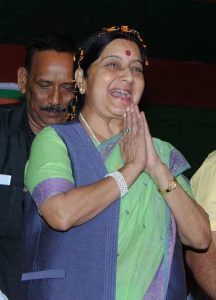
With Interpol shutting the door on the ED regarding a red corner notice to this former cricket czar, what emerges is the apathy of the Indian government to pin him down, as also technical lacunae
~By Sajeda Momin in London
The Lalit Modi case has just got murkier, with no Indian official willing to unravel the mysteries of the much-touted Red Corner Notice (RCN) which the on-the-run ex-chairman of IPL insists has fallen flat and established his innocence.
However, Modi’s jubilant and emotional tweet that “the sword hanging over his head” had been removed because Interpol has rejected the Enforcement Directorate’s (ED) demand for a RCN against him may be just a little premature. Interpol has said that, as of now, it does not have the grounds for a RCN—and that is due to the failure on the part of the Indian government to file for Modi’s extradition from the UK—but that is not to say that it has cleared him of any wrongdoing.
Modi, who is accused of misappropriating hundreds of crores by selling television rights during the T20 cricket tournament in 2009, has claimed that Interpol’s rejection of the long-pending RCN is evidence of the international agency giving him a clean chit.
MODI’S CLAIM
“Just as I boarded my flight I got the news that Interpol had finally investigated and concluded and reached a verdict in my favour with a detailed letter of rejection of India’s request for issuing of a red notice. The sword that was hanging over my head had suddenly gone,” tweeted Modi on his return to London from Barcelona last week.

However, the fallen cricket czar has put a spin on the international criminal police organisation’s two-para short note dated March 24, 2017. The Office of Legal Affairs of Interpol certifies that “as of today Lalit Kumar Modi, is not subject to Red Notice or diffusion and is not known in Interpol’s databases”. It also adds that “in the past the individual was a subject of data recorded in Interpol’s databases, yet the data was later cancelled”.
Modi has managed to escape a RCN due to the apathy of the Indian government to pin him down and on technicalities. As per Interpol’s Rules on the Processing of Data (RPD), a RCN is meant to trace fugitives who are absconding internationally. But in this particular case, it is well-known that Modi is living in the UK since 2010. Article 82 of the RPD clearly states: “Red Notices are published in order to seek the location of a wanted person and his/her detention, arrest or restriction of movement for the purpose of extradition, surrender or similar lawful action.”
HELPING HAND
The Indian government has been fully aware of Modi’s whereabouts ever since he fled in 2009, but for some “unknown reason”, it has been slow in applying for his extradition from the UK despite both countries having an extradition treaty in place. The names of BJP leaders Vasundhara Raje and Sushma Swaraj have emerged in the past for helping the scam-tainted cricket administrator.
In June 2015, The Sunday Times here reported an email conversation between Indian-origin British MP Keith Vaz and head of the UK immigration department Sarah Rapson, where Vaz cited Swaraj as facilitating travel documents for Modi. Swaraj had ridden out the storm and though the BJP government had been accused of “nepotism” and “nexus”, it had brazenly ignored the Opposition’s attacks.
Even then, the Indian government did not file for his extradition despite the fact that Modi was facing multiple cases and is wanted by the ED, income tax department, CBI and the Chennai Police which had first filed an FIR against him. He also has a pending non-bailable arrest warrant against him from a special court in Mumbai, besides several notices from the ED through his lawyers seeking his personal appearance before the agency’s Mumbai office.
Modi used the lack of an extradition order against him as part of his defense with Interpol. The agency had asked the CBI, its nodal office in India, why the extradition request had not been filed. They were told that in August 2015, Modi had been located in Malta and a formal provisional arrest request was sent to the NCB of Malta, but due to the absence of an extradition order between both countries for money laundering offences, Modi had got away.
EXTRADITION EFFORTS
The CBI also told Interpol that the file asking for the initiation of the extradition process under the Extradition Act of 2003 of the UK was sent on May 21, 2016, to the Ministry of External Affairs, but it had asked for some clarifications which were being examined.

In December 2016, the CBI told Interpol that getting Modi out of the UK was being looked at under the relevant provisions of the Mutual Legal Assistance Treaty.
Shoddy investigations by Indian agencies do not always pass muster in international forums. Interpol has cited the non-availability of a chargesheet as a reason for rejecting the ED’s plea. The ED had written to the Chennai police a number of times to get the investigation in the FIR expedited, but had met with little joy. The Chennai police FIR was filed in 2010 against Modi and half-a-dozen others acting on a complaint by former BCCI chief N Srinivasan.
Given the nature of the judicial data furnished by India, Interpol concluded that it was premature to issue a RCN against Modi. However, that does not bar the ED from moving Interpol again.
Modi, in his defence, submitted a copy of the Chennai police report purportedly stating that the police had concluded that the complaint was of a civil nature and not a criminal offence. It also said that it suffered from various legal defects, including that of jurisdiction and that a closure report would be filed in court.
To get Interpol’s decision reversed, the ED plans to study the order and take up the matter with the government and the CBI. It will ask the Ministry of External Affairs and the CBI to take up past cases where India and other countries had got the RCN by just providing legal documents.
Instead of trying to find fault with Interpol’s decision, it would serve the ED better to carry forward the investigation properly and pressurise the Indian government to send a Letter of Request to the UK to extradite Modi before it is too late.

